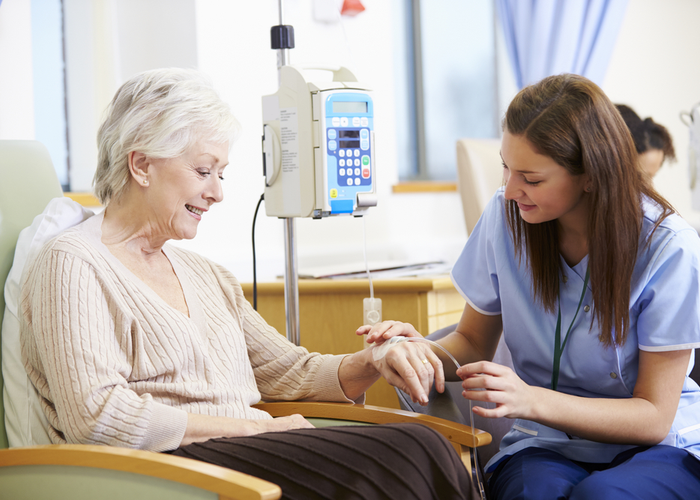
Nanomedicine has been a particular buzzword in the medical industry for a while now and has seen varied success in different research projects.
But what exactly is nanomedicine and how has it been used to develop breakthroughs in the scientific field? We take a deeper look at this exciting discipline and how Cure Cancer researchers are utilising it in their work against cancer.
What is Nanomedicine?
Nanomedicine is the use of extremely tiny materials (nanoparticles) for medicine. A form of transport for drugs, nanoparticles can go places drugs typically wouldn’t be able to go on their own.
Nanoparticles can be engineered and designed to package and transport drugs directly to where they’re needed. Because this approach allows drugs to have a greater effect in the intended areas they are delivered to, the side effects and damage to surrounding health tissues are subsequently minimised.
The nanoparticle drug-delivery systems can work in different ways. Along with carrying the drug for delivery, nanoparticles can be engineered to carry specific compounds that will let them bind, or attach, to molecules on tumour cells. Once attached, they can safely deliver the drug to the specific tumour site.
Nanoparticles can also help with drug solubility. For a drug to work, it must be able to enter the bloodstream, which means it needs to be soluble. Some cancer drugs are insoluble and have to be dissolved in a delivery agent which causes an allergic reaction in patients. To overcome these issues, chemists have developed a nanoparticle out of naturally occurring protein which can carry the drug and make it soluble but without the allergic reactions.
Tumours commonly have blood vessels sprouting through and off them. These allow chemotherapy drugs to readily enter the tumour, but because chemotherapy molecules are so small, they also diffuse through the vessels and out of the tumour, attacking surrounding tissues.
Nanoparticles are larger molecules that get trapped inside the tumour, where they do all the damage. Once they have delivered their drug cargo to cells, nanoparticles can be designed to break down into harmless by-products. This is particularly important for children, who are still developing.
Nanomedicine In Cancer Research
Cure Cancer’s researchers, both past and present, are doing some significant work in the field of nanomedicine.
Professor Maria Kavallaris Head of the Tumour Biology and Targeting Program, Children’s Cancer Institute
Founding Director, Australian Centre for Nanomedicine
A Cure Cancer grant recipient in 1999 and 2003, Maria’s remarkable contributions to cancer research include the pioneering use of nanotechnology. Her work has seen discoveries into understanding the mechanisms of action and resistance to cancer therapy, including the identification of how some tumours can grow and spread in the body. Maria has applied this knowledge to develop effective and less toxic cancer therapies using nanotechnology.
Maria has gone on to secure over $45 million in research funding since receiving her Cure Cancer grants. Her contributions to the field have been recognised by numerous national and international awards and prizes, having also been named the 2020 NSW Premier’s Woman of the Year. She has also mentored and trained over 50 students and postdoctoral researchers throughout the course of her career.
Several of our current grant recipients and alumni work with or alongside Professor Kavallaris at the Australian Centre for Nanomedicine.
Project Leader, Children's Cancer Institute: Tumour Biology and Targeting Program
Orazio joined CCI and the UNSW Australian Centre for Nanomedicine in 2013 when awarded a highly competitive Vice Chancellor's Postdoc Research Fellowship to conduct research under the mentoring of Professor Maria Kavallaris. His research is focussed on the development of innovative strategies for the treatment of neuroblastoma and glioblastoma with nano-modified natural antioxidants.
Recently, his work with Maria made national and global headlines due to the discovery that by removing copper from the blood you can destroy some of the deadliest cancers that are resistant to immunotherapy.
Dr Angelica Merlot Pancreatic Cancer Researcher & Scientia Research Fellow, Children’s Cancer Institute & UNSW
Angelica focuses her current research on the characterisation of specific molecular pathways involved in cancer progression and metastasis, and the development of nanoparticles to improve drug delivery.
She was also named the 2019 Harvey Norman Young Woman of the Year for her contribution and dedication to cancer research.
Dr George Sharbeen Pancreatic Cancer Researcher, UNSW
George focuses his work on identifying new therapeutic targets for treating pancreatic cancer. Once a target is identified, George and his team use a novel nanoparticle - developed in the lab of well-known researcher Associate Professor Phoebe Phillips (CC grants 2009 and 2012) in collaboration with the Australian Centre for Nanomedicine – to inhibit it in models of pancreatic cancer and stop tumours from spreading.
‘Our achievements to date include the identification of proteins in cell walls as therapeutic targets, and the development of a nanoparticle that can travel through the bloodstream, enter pancreatic tumour cells and inhibit any target of interest,’ says George.
Dr Nicholas Fletcher Postdoctoral Research Fellow, Centre for Advanced Imaging and Australian Institute for Bioengineering and Nanotechnology
Nicholas’s current research focuses on developing new, targeted treatments for triple-negative breast cancer using nanotechnology. Primarily, he has worked on developing polymeric nanoparticles as both diagnostic and therapeutic materials.
Using nanomedicine devices, therapeutic drugs are delivered to tumours at the same time as imaging agents, which allow Nick and his team to track where the particles go.’
By using components on the nanoscale, Nick and his colleagues can take advantage of physical, chemical and biological interactions that wouldn’t otherwise be possible. ‘I hope the research I’m doing may help push the development of targeted nanomedicines,’ he says.
The discovery of new and effective therapies to treat cancer would not be possible without research. Please continue to support this incredible work by making a donation, so that we can one day live in a world where the threat of cancer has been eliminated for good.
DONATE